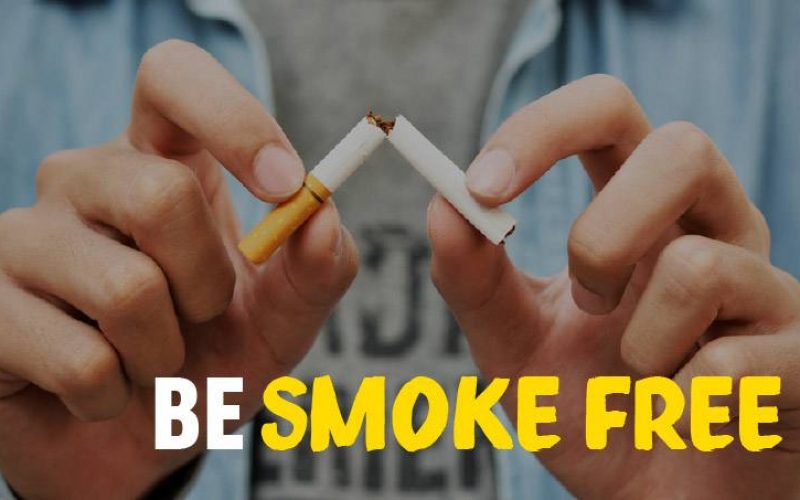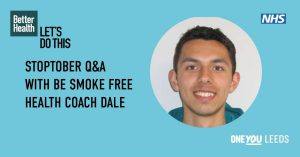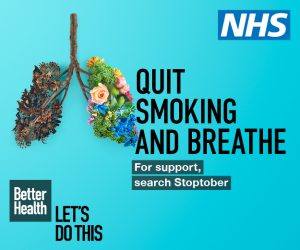The following blog has been written by Dale Triggs from One You Leeds.
As part of Stoptober, we asked the Health Coaches at One You Leeds some questions about handling cravings during a quit attempt and what their advice is on stopping smoking. We hope you enjoy reading our Q&A with them!
1. What is Nicotine withdrawal and how long does it last?
“Nicotine withdrawal describes a range of physical symptoms, indicating a craving for nicotine. Nicotine isn’t a harmful substance on its own, however it is the addictive element of tobacco smoking that gets smokers hooked. Withdrawal can occur from 30 minutes after your last cigarette.
Nicotine withdrawal shouldn’t last a long time when attempting to quit, although this can vary depending on a number of factors including how much tobacco someone may have smoked on a daily basis and what treatments they may be using to support their quit. Examples of withdrawal symptoms may include light headedness, restlessness and fluctuations in mood.
These symptoms are usually very mild and most shouldn’t last for any longer than 4-6 weeks of a quit. If they persist for longer, it’s really important that you speak to a stop smoking adviser to help you to find a way of managing them.”
2. What is your advice on handling cravings?
“It’s really important to identify the difference between a ‘Physical craving’ and a ‘psychological urge’. A physical craving is your body’s response to craving the addictive element of smoking, nicotine. These cravings can’t just disappear by applying a distraction or thinking of something else, so it’s really important to use a stop smoking treatment to help manage them. The main treatments that we offer with One You Leeds are Nicotine Replacement Therapy (NRT) and Champix. The NRT provides a healthier, clean source of nicotine that will satisfy your physical cravings.
Alternatively, Champix works on your nicotine receptors and removes the reward for smoking. It’s really important to choose a treatment that you believe will work best for you as this will increase your chances of having a successful quit.
Psychological urges are due to the fact that smoking is a habit, and you may have associations with particular situations and smoking. These urges never completely disappear, however by creating some new habits and distractions these urges can over time become a lot more manageable and less frequent. By creating new habits this will strengthen your quit for the future, as you will have new habits that you will think of doing first before the thought to have a cigarette develops.
A good idea at the beginning of a quit attempt is to reflect on the reasons why you have particular cigarettes throughout the day. If you are able to identify whether you are smoking for nicotine cravings or habit, this will help you to identify where the treatment will be most effective and also find out where you need to create new habits.”
3. How many cigarettes a day is heavy smoking?
“Heaviness of smoking can depend on a number of factors, the number of cigarettes that you smoke may come to mind, however smoking over 20 or 25 a day does not necessarily define a heavy smoker.
A few questions that you may ask yourself are;
- How soon after I wake up do I have my first cigarette?
- How much of the cigarette do I smoke?
- How deeply do I inhale the cigarette smoke?
- And can I go long periods of the day without having a cigarette?
The type of tobacco smoking can also influence heaviness of smoking, for example if you use roll ups, it can very much depend on how much tobacco you use in your roll ups.
If you do categorize yourself as a heavy smoker, this does not necessarily mean that it will be harder for you to stop smoking compared to moderate or light smokers. As long as you get the right support and follow the advice from your stop smoking adviser, you will have the best chance of achieving a successful quit.”
4. What are the benefits of stopping smoking?
“There are many benefits of stopping smoking and you don’t need to wait too long to reap the rewards. Key reasons that encourage people to stop smoking can be improved physical and mental health, more spare cash and benefits to the wellbeing of family and friends.
Physical health benefits can start to occur within 20 mins of stopping smoking where blood pressure returns to normal and circulation improves. Between 24-48hrs post quit your body will be clear of nicotine and the harmful gas carbon monoxide that contributes to COPD and other smoking-related conditions will be down to the level of a non-smoker. After 72 hrs, you should be able to breathe more easily and feel more energetic. Between 3-9 months post quit, lung capacity may start to increase and coughing and wheezing should have stopped or reduced.
In the long-term, between 5 and 10 years after your quit date, compared to a smoker your risk of having a heart attack will be halved and risk of lung cancer may also be halved. Many of those who stop smoking also report benefits to their mental health. There is also no safe level of secondhand smoke, therefore stopping smoking can help protect the health of family and friends around you.”
5.What is the most effective way to stop smoking?
“The most effective way to stop smoking is to use a licensed stop smoking treatment alongside the behavioural support of a stop smoking service. Every smoker goes on a different journey to stop smoking, therefore it is important that you choose whichever treatment is most appropriate for you and use the support available to help you to use the treatment correctly and develop all the strategies tailored for you to maintain your quit in the future.
It is very important to understand your motivations for quitting and ensure that you are doing it because you want to and are looking forward to the benefits of stopping smoking. An abrupt quit in the most effective way in contrast to cutting down or prolonging your quit.
Therefore, discussing a plan with a stop smoking adviser will help you to achieve this and enable you to have more time whilst you are using treatment to focus on developing new habits which will support you to stay quit in the future.”
6.If someone was struggling in their quit attempt, what advice would you give them?
“I would advise them to get in contact with their stop smoking adviser or the local stop smoking service to discuss a plan to overcome the challenges. It’s perfectly normal to face challenges during a quit attempt, however it is really important to be proactive and create a solution to prevent initially a re-lapse and strengthen the chances of staying quit in the future.
It may be useful to reflect on the benefits that they have already received since stopping smoking and weighing them up against the possible consequences of re-lapsing. Also, thinking about their motivations and focusing on them may help to deal with the challenges.
It is crucial to use the support available to you on a stop smoking service and also from family and friends so you don’t feel like you are tackling your quit on your own.”
If you’re trying to quit smoking and would like more advice like this, you can join the Be Smoke Free programme with One You Leeds for free. You can sign up on their website anytime and their friendly advisors can also prescribe you NRT products to help in your quit attempt.
Thank you to our guest blogger Dale Triggs from One You Leeds.
Other Resources
To find out other ways to help reduce your cancer risk visit Leeds Cancer.
To access free information, support in stopping smoking and a free personal quit plan visit One You Leeds.
To get involved with Stoptober visit NHS.






